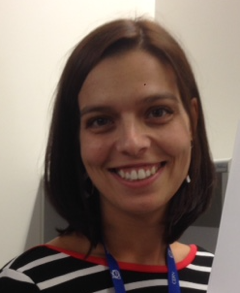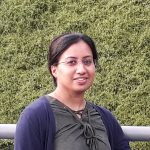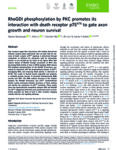Lilian Kisiswa obtained a PhD in 2011 in Visual Neursocience at Cardiff University, UK, under the direction of Prof. James E Morgan. Her PhD thesis was entitled “The role of inhibitor of apoptosis (IAPs) in retinal ganglion cell death and dendrite remodelling“. She then did postdoctoral studies at the Department of Molecular Biosciences, School of Biosciences, Cardiff University, under the direction of Prof. Alun M Davies. Lilian joined our Stockholm team at Karolinska Institue in August 2013 to investigate the interplay between RIP2 and TRAF6 in p75NTR signaling. Her work led to a publication in Cell Reports. She now joins our NUS team to continue work on p75NTR and RhoA signaling.
Marta Garcia-Miralles obtained her PhD in 2013 at the Department of Neurodegenerative Diseases, Hertie Institute for Clinical Brain Research, University of Tuebingen, Germany, under the direction of Prof. Thomas Gasser, and with the characterisation of a novel LRRK2 mouse model of Parkinson’s disease. She then worked as a postdoc fellow at the Translational Laboratory in Genetic Medicine (TLGM), A*STAR, Singapore, under the direction of Dr. Mahmoud Pouladi. She is joining our NUS team to contribute to our efforts to understand the roles of neurotrophin signaling in cerebrovascular disease.
Vanessa Rodrigues holds a PhD in Pathology and Molecular Genetics from ICBAS, University of Porto, Portugal, with a thesis work entitled “Understanding P-glycoprotein mediated multidrug resistance in cancer: new potential targets, biomarkers and molecular inhibitors”. Vanessa joins the NUS group to lead a drug discovery program to identify novel chemical probes targeting p75NTR, TrkB and ALK7 receptors.

Vanessa Rodrigues, PhD
Research Fellow
Tel: +65 6601 3262
Email 

Ajeena Ramanujan, PhD
Senior Research Fellow
Tel: +65 6601 3262
Email 
Ajeena Ramanujan holds a PhD from the Jawaharlal Nehru University, India, for work on the interaction between FZR1 and the Retinoblastoma protein in the control of cell-cycle regulation, under the direction of A/Prof Swati Tiwari. Ajeena is joining the NUS group to lead investigations on p75NTR signaling mechanisms involving RhoGDI and RhoA proteins and their actions on the cell cytoskeleton and neurite outgrowth control.
Shuhailah Salim holds a Bachelor in Science from Nanyang Technological University. She did a research internship at the Institute of Molecular and Cell biology (IMCB, A*STAR). She joins our NUS group to support biochemical, tissue culture and drug screening studies.
New Chih Sheng holds a Bachelor in Science from the University of Toronto. He did a research internship at the Institute of Molecular and Cell biology (IMCB, A*STAR). She joins our NUS group to support our metabolism research projects with mouse genotyping and tissue culture.
Yi Chenju holds a Bachelor in Clinical Medicine from Tongji Medical College, Huazhong University of Science and Technology, China, a PhD in Neurology form the same institution and an MD from the Institute of Brain Research, University of Tübingen, Germany. She performed postdoctoral studies at College de France under the direction of Drs. Christian Gaume and Annette Koulakoff. Chenju is joining the NUS group to lead investigations on p75NTR-mediated mechanisms of neurodegeneration in mouse models of Alzheimer’s disease.
Senior RF Lin Zhi, NMR wizard and first lab member to be hired at our NUS lab, moves on to initiate his independent career after successful postdoc period at the lab. Lin Zhi will be group leader at Tianjin University in China. He remains a Visiting Research Fellow of our Department and we look forward to continued collaborations with him. All the best for you Lin Zhi!
Eunice Sim holds a Bachelor in Science from the University of Western Australia. Until recently, she worked as Senior Laboratory Officer at the Advanced Molecular Pathology Laboratory of the Institute of Molecular & Cell Biology, A*STAR, Singapore. Eunice joins the NUS group to assist with various technical tasks, including mouse genotyping and histological analyses.
Ee-Soo Lee obtained a PhD from the University of Groningen, The Netherlands, under the direction of Prof. Martin Harmsen. Her doctoral studies were based on investigations of the interplay between TGF-β and fluid shear stress in regulation of endothelial cell phenotype and functions, in the context of oxidative stress and cellular senescence. Ee-Soo is joining our nascent metabolism team to focus on studies at at understanding the signaling mechanisms by which teh action receptor ALK7 regulates catecholamine sensitivity in adipocytes.
Chang Liu defended her thesis at the University of Sydney, Australia, under the direction of Prof. Jürgen Götz. Her doctoral studies were aimed towards addressing the distribution and physiological function of tau isoforms using tau isoform-specific monoclonal antibodies. Liu is joining our NUS group to lead a new line of research aimed towards the elucidation of the roles of neurotrophin signaling in cerebrovascular disease, focusing on their actions on cellular elements of the brain microvasculature under normal conditions and following cerebrovascular damage and AD-related neurodegeneration.
Raj Kamal Srivastava obtained his PhD in 2008 at the Department of Zoology, Faculty of Science in Banaras Hindu University, Varanasi, India. He did postdoctoral studies at the Institute for Physiological Chemistry and Pathobiochemistry, Johannes Gutenberg University of Mainz, Germany. His studied the role of central and peripheral CB1 receptor in obesity and behavioral disorder using transgenic mouse lines deleted for CB1 receptor in adrenergic and noradrenergic neurons, CamK2a expressing neurons, and adipocytes. CB1 receptor deletion from adipocytes revealed a significant role of the brain-sensory-adipocyte axis in obesity. The data highlight the role of CB1 receptor in sympathetic activity, food intake and stress induced obesity. At the NUS lab, Raj will lead studies on the roles of activin receptors ALK4 and ALK7 in adipogeneiss, adipose tissue homeostasis and obesity.
Goh Ket Yin earned a BSc at UCSI University, Malaysia, and is MSc in Medical Biosciences from University of Bath, United Kingdom. She has solid training in cell culture and transfection techniques, western blots and immunohistochemistry. She joins to assist in animal care and handling, mice genotyping and tissue harvest.

Goh Ket Yin, BSc
Research Assistant
Tel: +65 6601 3262
Email 
Yong Shan May has a BSc from the University of Malaya and will be defending her PhD thesis at NUS next year with title “ApoE isoform-specific modulation of NMDA receptor signalling pathway during ageing”. She has extensive expertise in experimental neuroscience including neuron isolation, immunohistochemistry and behavioural studies. Shan May joins our group to help with mouse breeding and genotyping, as well as immunohistochemical analyses of neurons in culture and tissue sections.
Eddy Goh obtained a PhD in Biochemistry at University College London, UK, under the supervision of Prof. Ivan Gout for his work on the nuclear functions of ribosomal S6 kinases. He did postdoctoral studies at the University of Dundee, Scotland, under the direction of Prof. Philip Cohen. Here Eddy studied mechanisms of regulation of E3 ligases in innate immunity. At our NUS group, he will investigate the mechanisms by which p75ntr couples to the NFkB pathway and devise novel mechanism-based approaches to modulate p75 signaling with small molecules.
Three years after joining our group at the Karolinska Institute, Tingqing Guo moves to Singapore to lead our metabolism programme in NUS.
Tingqing Guo got his PhD at the Shanghai Institute of Biochemistry and Cell biology. His first postdoc was with the lab of Alexandra McPherron at NIDDK, NIH. His work at the McPherron lab focused on the role of myostatin in insulin sensitivity and fat deposition resulting in an influential paper in the journal Diabetes. During his tenure at our KI group, Tingqing spearheaded investigations on the role of TGF-beta superfamily receptors ALK4 ALK7 in metabolic regulation, with an emphasis on adipose tissue differentiation and physiology. He will continue those studies at our NUS lab in Singapore.
Samuel Ong has worked as a lab technologist in NUS for many years. He will be assisting our group with lab administration issues on a part-time basis. We welcome his help!
Liz Lim obtained a PhD at the Institute for Molecular and Cell Biology A*STAR, Singapore, under the supervision of Dr. Sohail Ahmed for her work on Cdc42 in filopida formation. She subsequently did postdoctoral studies at DUKE-NUS Graduate Medical School Singapore under the direction of Dr. Marc Fivaz during which she investigated alterations in axonal transport in neurons compromised in DISC1 function. She joins the group with an extensive experience in live cell imaging and several of the most important “F-techniques”, including FRET, FRAP and FLIM. Her task will be to unravel mechanisms of receptor activation and intracellular signal compartmentalization and propagation in death receptors, including the p75 neurotrophin receptor.
Jason Tann obtained a Bachelor degree in Bioengineering from the National University of Singapore in 2012. He has expertise in diverse cell culture techniques, including primary neurons and stem cells, from several research projects conducted at the Department of Bioengineering, NUS, and the ASTAR/Duke-NUS Neuroscience Research Partnership. He joins the group to assist with primary neuron culture studies to understand death receptor signaling in health and disease.
Julia Simon Martin obtained a PhD in Molecular Biology in 2011 from the Universidad Autonoma de Madrid, Spain under the direction of Drs. Luis Miguel Garcia-Segura and Maria-Angeles Arevalo, for discoveries concerning the actions of Neurogenin 3 on dendrite and synapse formation in hippocampal neurons. She is joining the NUS team to unravel the downstream signal propagation mechanisms underlying the actions of neuronal death receptors in health and disease.
|
|
|
Warning: Undefined array key "full_width_footer" in /customers/2/6/6/carlosibanezlab.se/httpd.www/NUS/wp-content/themes/atahualpa_3723/footer.php on line 93






